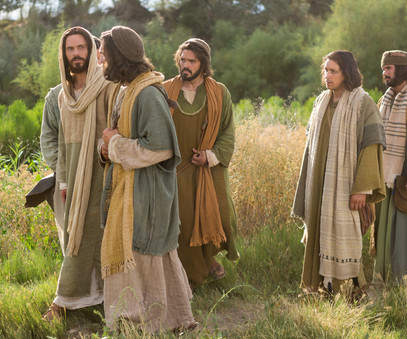As today's Gospel story unfolds, there is a sudden turnaround in the relationship between Jesus and Peter. In the verses immediately preceding today's (last Sunday's gospel) Jesus sings Peter's praises ("Blessed are you Simon son of John....") and is ready to give him the keys to the kingdom of heaven. Peter will have authority over Jesus' mission. Yet, today Jesus turns on Peter, calls him "Satan" and turns away from him.

I'm sure Peter was feeling pretty good about himself after being called "Blessed," and he must have been quite shocked with Jesus' sudden change of mood. He had simply taken Jesus aside and told him not to think about his suffering and death. Yet Jesus rebuked him publicly, embarassing him in front of all of his friends.
"You're thinking not as God does," the Lord tells Peter, "but as human beings do." A Jesus without the Passion is simply incomprehensible from the Gospel's perspective. His selfless giving of life and the validation of that gift in resurrection are the clearest statements of his mission. That is why Peter's resistance to the idea of Jesus' suffering should be taken seriously. Jesus not only calls Peter "Satan," but he tells Peter that he is an "obstacle" - literally a "stumbling block" in Jesus' way.
The image of "disciple" now takes on an interesting mix. Peter, the "founding rock" upon which the community is built, is also capable of being a "stumbling block" who stands in the way by making judgments from the wrong perspective. The right perspective is Jesus' own. Following Jesus has its cost, but such faithfulness also has its reward.
The same holds true today. The problem is that we attempt to pre-define God - who He is and how He enters our lives. We try to impose limits on God that we would never dream to impose on anyone else with whom we have entered a relationship. We have decided in advance what kind of God shall enter our lives and under what conditions. And when we do that, the God we find - and the God we proclaim - is the God of our own limited expectations.
Which takes us back to today's gospel. Peter just doesn't understand that while he professes him to be the Messiah, Jesus must still continue to walk the path that will cause him suffering and death. Peter wants to remain in the moment, and he doesn't want to hear that if he really believes in Jesus and follows the way Jesus is indicating, he too may have to suffer and die for his faith.
The grace of our Gospel today is to awaken our hearts from their distractions and to stir us to examine our spiritual lives more fully. Like Peter, we cannot let ourselves get in the way of Christ.
Jesus invites us not to accept the values and thinking of the crowd. To understand the whole picture of our life in Christ we must think as he does and not as we would like him to. Our individual responses will, of course, bind us more profoundly to Jesus. They, in turn, will bind us more closely to one another so that we will not only give an individual, but also a communal witness to Christ -- for only then can we be the “ekklesia,” “the community built upon the rock,” called to effectively impact our world.





